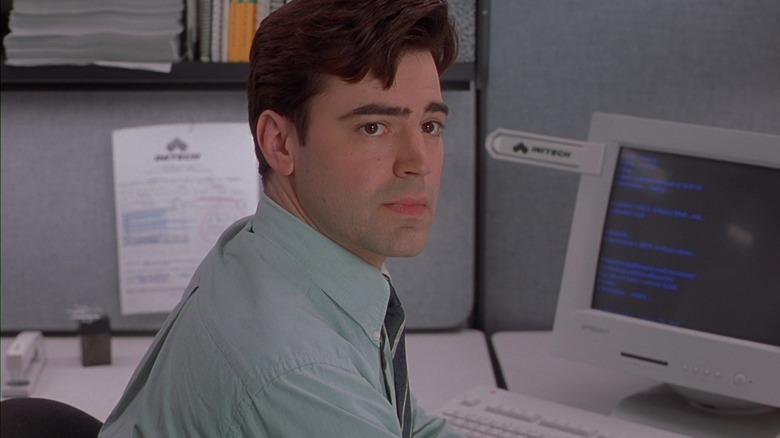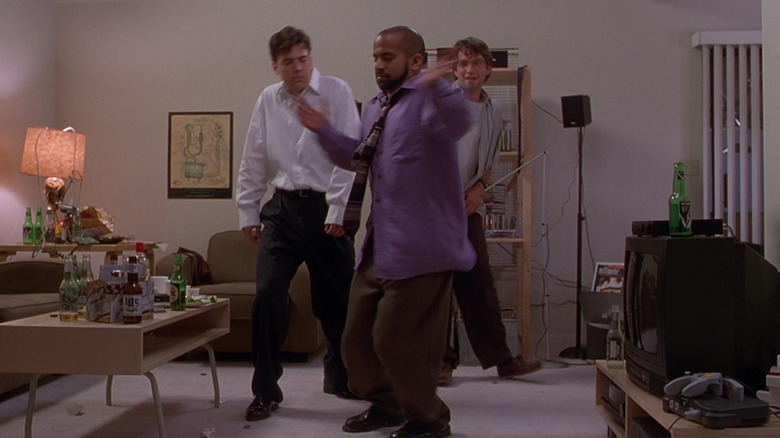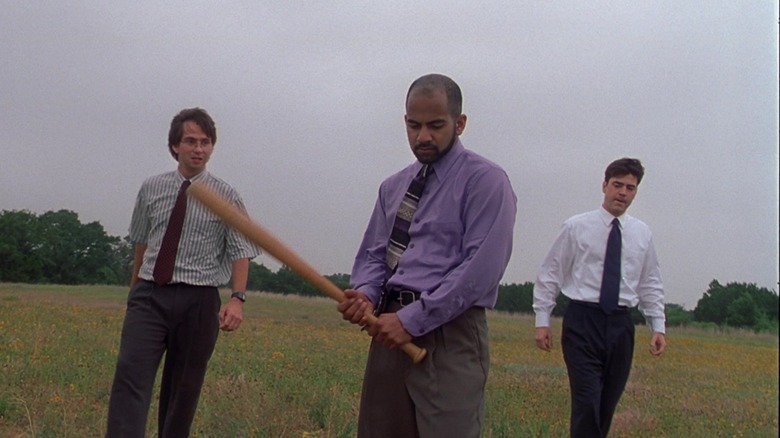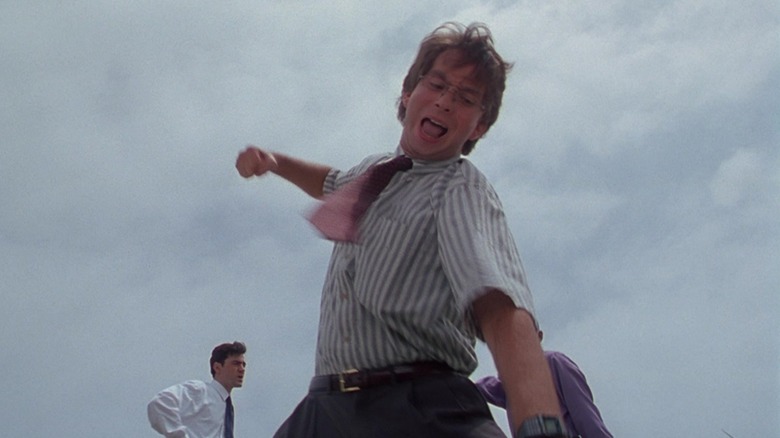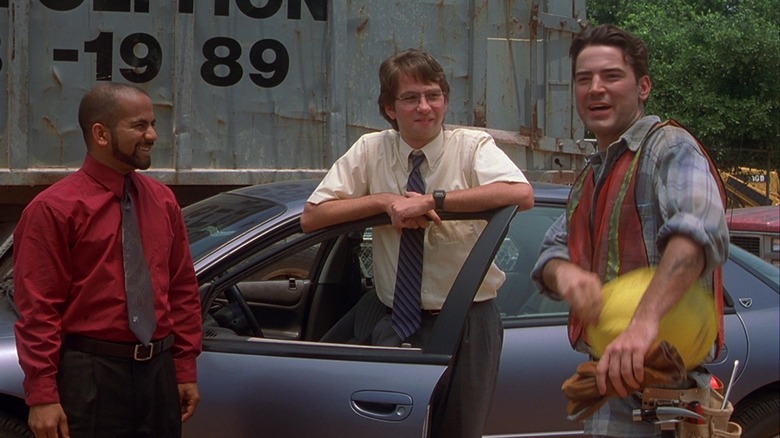The Best Scene In Office Space Was Almost Ruined By The Studio [SXSW 2024]
"Office Space," Mike Judge's satirical take on white collar office culture, disappointed at the box office but soon became a cult favorite after it arrived in 1999. That was mostly thanks to home video sales and Comedy Central airing the film multiple times after its theatrical run. But "Office Space" thoroughly deserved whatever cult status it attained, because it always felt very much ahead of its time.
The film stars Ron Livingston as Peter Gibbons, a put-upon programmer who spends his days amid the bleakly oppressive environs of software company Initech. After being hypnotized to stop caring about his job, Peter takes a lackadaisical approach to work and surprisingly begins to climb his way up the corporate ladder. But when his colleagues Samir Nagheenanajar (Ajay Naidu) and Michael Bolton (David Herman) are fired, Peter and his friends mastermind a plan to steal money from Initech via a software virus. The office culture comedy of it all is extremely well-realized, and Judge's observations are razor sharp. But there's another aspect of "Office Space" that makes it a timeless classic: the soundtrack.
Full of classic '90s gangsta rap, the "Office Space" soundtrack is one of the best parts of the film, making for a hilarious clash between the music's unbridled braggadocio and violence and the sterile, buttoned-down world of the film. Unfortunately, 20th Century Fox (now 20th Century Studios following the Disney-Fox merger of 2019) wasn't a big fan of the music, and they almost managed to ruin one of the film's standout scenes.
Gangsta rap in Office Space
The "Office Space" soundtrack is just another example of how ahead of its time the film was. Writer/director Mike Judge specifically used the clash between the visceral sounds of gangsta rap and the blandness of office culture for comedic effect, long before Seth Rogen would pair hip hop with his white dude stoner comedy shenanigans. For example, the credit sequence for "Knocked Up," wherein Rogen and his stoner buddies slack off to the tones of Ol' Dirty Bastard's "Shimmy Shimmy Ya" feels like it continues a legacy very much started by Judge. It's apiece with the "Office Space" sequence in which Peter Gibbons revels in his newfound carefree attitude, accompanied by the mellifluous tones of Geto Boys' "Damn It Feels Good to be a Gangsta."
This was all a deliberate and specific choice on the part of Judge. At a 2024 SXSW "Office Space" 25th anniversary panel attended by /Film writer Ryan Scott, Judge spoke about his decision to use hardcore gangsta rap for his office culture satire:
"That music, at that point, had been in a lot of the kind of gangsta movies, but I hadn't seen anyone use it just purely for the energy and the anger of it, and it just seemed to me like it would be really funny."
Unfortunately, this was one of the many things that drove Fox executives crazy prior to the release of "Office Space." In fact, it seems the soundtrack was a particular sticking point for then-president of 20th Century Fox Film Group, Tom Rothman, who almost nixed this integral and influential aspect of the film before it hit theaters.
Fox wanted to take the gangsta rap out of Office Space
The lasting appeal of "Office Space" undoubtedly has something to do with its endlessly quotable lines and meme-able scenes. Alongside Swingline staplers and TPS reports, one of the most recognizable of these frequently-memed elements is the printer scene. The moment when Peter, Michael, and Samir take their perpetually-malfunctioning office printer into a field and destroy it with a baseball bat was inspired by Judge's experience writing his show "Beavis and Butthead," and it remains one of the film's most famous scenes. Part of its popularity comes from the ridiculous way in which Peter and his cohorts lay waste to the printer, as if they're carrying out a particularly brutal mob hit. But what really makes the scene is the song that accompanies it: Gheto Boys' "Still."
A perfect representation of the absolute unrestrained vulgarity of '90s gangsta rap, "Still" is unrelenting in its celebration of death and violence. The track's "die m*****f*****," die m*****f*****," kill" refrain set to shots of office peons going nuts on a piece of hardware is the perfect encapsulation of why Judge was right about the energy of gangsta rap being funny when used in the right context. But as the "Beavis and Butt-head" creator told the SXSW panel, this scene in particular had Tom Rothman concerned:
"Rothman kept arguing and saying, 'You gotta take that song out' and finally I did something I probably should not have done, but it worked. I should have just said 'I'll take my name off the movie, that's the song,' but I said, 'OK, at the next test screening, if the focus says they don't like the music, I'll take it out.'"
Thankfully, this approach worked out for Judge but not before he had to endure an unusually tough test screening.
Mike Judge got his way after a tough test screening
Not only did Fox want the music in "Office Space" changed, it seems the test screening Mike Judge agreed to endure was hosted by a particularly snarky host, intent upon getting the reaction Fox needed. As Judge told the SXSW panel:
"It gets to the focus group, and the moderator, she was trying so hard to pollute the water [...] it's like 20 people and we're behind them and she goes 'So what did you think about the music?' Then all 20 of them started going, 'Oh it was great,' and she goes, 'But what about some of the rap songs,' and then they go, 'Oh, it was great, it was great' [and the moderator replies], 'But maybe there were too many of them?' And she tries to get someone to nod along with her and they would not give her anything."
According to Judge, one audience member sealed the deal when he explained to the moderator exactly why the gangsta rap was so integral to the scene, saying, "That's what's cool about it, these nerdy white boys and the music's angry." Thus, the gangsta rap stayed and the film was all the better for it, with Judge even giving Tom Rothman credit for "never [saying] anything about it again" and "keeping his word."
Even after this, however, the studio would try to impose their own soundtrack preferences on the film. As the director told the audience at SXSW:
"If you watch the trailer, the trailer's like Fatboy Slim, it's like [singing mockingly] 'Right about now, the funk soul brother,' I mean they wanted like Chumbawamba for this thing, right. What a wholly different movie this would be if it was 'Right about now, the funk soul brother.'"
Office Space embraced gangsta rap at a time when it was still controversial
According to Mike Judge, Tom Rothman wanted the music changed because he had some concept of what it meant for a film to be "fun." As the writer/director told the panel, "[Rothman's] battle cry the whole time, including wanting Ron to smile, was 'I just want it to be fun,' and I would say, 'Well, it is fun.'"
It's worth bearing in mind that "Office Space" was made during a time when gangsta rap had been the subject of much public scrutiny. The film arrived at the end of a decade which saw the conservative right launch an all-out assault on rap and its supposedly degrading effect on society. Politician and civil rights activist C. Delores Tucker was one of the leaders of this war on rap, proclaiming it to be "pornographic filth" in 1993 and even buying stock in record companies just so she could turn up at shareholders' meetings and air her grievances.
All of this is to say that when Judge was working on "Office Space," gangsta rap was far from an accepted part of mainstream culture, and it was still very much seen as subversive and oppositional by many. In that sense, it's hard to imagine that Rothman was simply concerned about "Office Space" being "fun." The 20th Century Fox Film Group executive must have felt some pressure to limit the amount of this supposedly harmful music being used in his studio's films.
Thankfully, both Judge got his way in the end, and while you can't argue that "Office Space" cemented hip hop in mass culture in the way that "The Fresh Prince of Bel Air" did, it surely helped in the battle against rap's detractors, even if it was all a joke.
